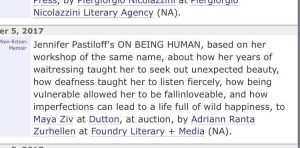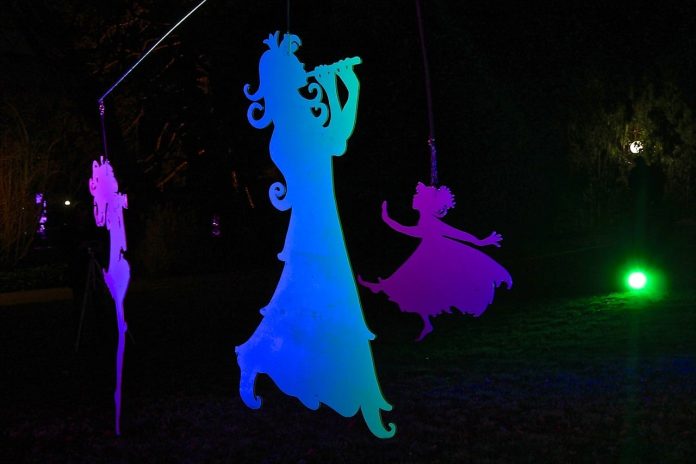By Laura Leffler
In bed one winter morning, when I was so pregnant with the twins that I spent hours each day icing my fat feet, propped high on pillows, I floated around personality traits as if they were names. I think the girl should be creative, I told my fiancé. She’ll carry a sketchbook wherever she goes. And the boy will be a bookish type with round glasses. They’d both be terrible at math and sports. I was laughing at myself, enjoying the ridiculousness of it, knowing that these little people growing inside me would be who they were no matter that I planned for them.
But my fiancé grew serious. “You know,” he said, “I want them to be scrappy.”
I recoiled – I could actually feel my lips twisting into a sneer. I scanned through the list of things I wanted my children to be: happy, healthy, and kind, of course, but also, more secretively, bookish, artistic, beautiful, popular. Scrappy made me think of a shaggy little dog. Scrappy made me think of the pugilistic kids I knew back home, kids who showed up uninvited to parties, straggly kids, kids who tried too hard. Scrappy was not on my list.
Here’s the thing: I grew up easy. My parents were present but permissive. I had two gorgeous sisters whose footsteps were a cinch to follow, and a younger brother who was like a best friend. I grew up behind wrought iron gates, in a stone house with nine bedrooms and climbing ivy and a laundress who pressed my school uniform. I did only the things I wanted to do, and quit everything else. I got by on a B average without trying very hard. Life was absolutely not perfect, but it was indulgent.
I understood that my house was different than the others on our street. I knew that my family was different, but I never thought about privilege as such until college, when my reading lists diversified and I went thrift-store shopping with my new best friend who, as it turned out, grew up in a trailer park outside Louisville. And after graduation, when I – unemployed – managed to pay my Brooklyn rent, while my roommate had a second job waiting tables at the 42nd Street Appleby’s and still bounced a check here and there.
But the ease of my childhood burned out as quickly as childhood itself. My parents stopped paying my rent. At twenty-five, my cushion was dissolving under me. I was teaching yoga for free, living at my parent’s house again, with no career prospects. I knew I needed to rely on myself, but I didn’t know how. I knew I needed a paying job, but I didn’t know what I should do. Growing up, no one had asked me who I wanted to be, so I thought about boys and parties rather than majors and careers. I assumed, and my parents assumed for me, that life, once easy, would always be so.
In the decade that followed my quarter-life crisis, I dipped a toe into several different careers. Predictably, I ended up in the one that came the most easily – gallery girl. I bounced from gallery to gallery, hating all of them except the very first, not standing up for myself when I wanted a raise, a promotion, a title change. I just quit. By thirty-five, I had a logistics job at a prestigious New York gallery, which sounds nice, but I was doing the tedious, repetitive, grunt work of cataloging and customs reporting. I wasn’t getting paid enough. Sales people years younger than I would condescend to me in company-wide meetings. I silently seethed, constantly wondered how I got there.
At thirty-five also came the pregnancy. Finally, I thought, motherhood. I believed that, like my own mother, I would be a natural – breastfeeding would be a snap, I’d understand children’s moods and wouldn’t fret about a silly tantrum or cold.
But the twins arrived early. They were rushed from me to the neonatal intensive care unit. My milk didn’t come in. My son was diagnosed with severe kidney disease. I realized how wrong I had been: motherhood would not be easy. Motherhood would not come naturally. Motherhood would be far more brutal than the art world. And you can’t quit motherhood.
A few years and a third child later, with beautiful days, crises, hospital stays, milestones, stomach bugs, and moves behind me, and I can see what my parents unknowingly taught me when they gave me an easy childhood – that effort was unbecoming. Effort was embarrassing.
As motherhood forced me to stick around through the difficult and the ugly, through the vomiting and crying and blistered nipples and pain of exhaustion and the never-ending fear that I was fucking it all up, it taught me that effort, real effort, isn’t embarrassing. It’s the only thing. Without effort, there is nothing to accomplish. There is wasted life.
It took a long time, but I understand what my now-husband meant when he said he wanted our children to be scrappy. He wanted to teach them that effort is worthwhile. That it’s not always easy, doing what you love, but that if you never give up, you never waste a single day.


